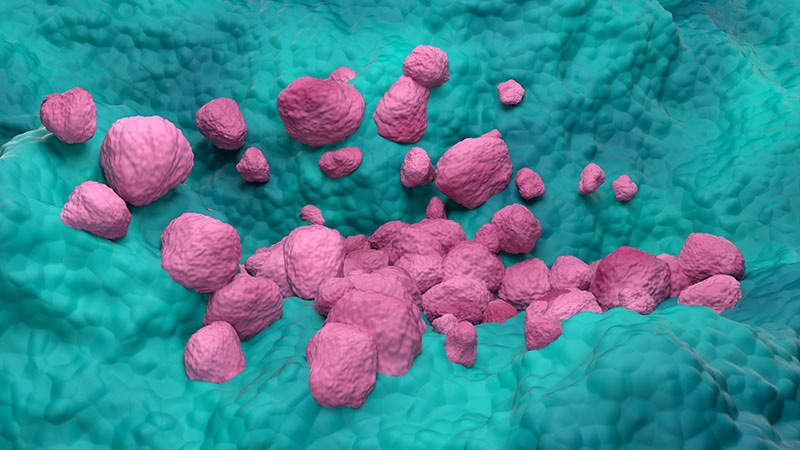Novel ADC Patritumab Deruxtecan Shows Promise in Heavily Pretreated EGFR-Mutated NSCLC
Core Concepts
ADC patritumab deruxtecan shows promising efficacy in heavily pretreated EGFR-mutated NSCLC patients.
Abstract
The content discusses the results of a phase 2 trial presenting the efficacy of the antibody-drug conjugate (ADC) patritumab deruxtecan (HER3-DXd) in heavily pretreated patients with EGFR-mutated non–small cell lung cancer (NSCLC). Key highlights include:
- 30% of patients achieved an objective response with HER3-DXd.
- Median overall survival approached 1 year.
- HER3-DXd emerged as a promising therapy in this patient population.
- Limited treatment options for patients resistant to TKIs.
- HER3-DXd consists of an anti-HER3 antibody attached to a topoisomerase I inhibitor.
- Promising efficacy results in patients with advanced EGFR-mutated NSCLC.
- Safety profile consistent with previous reports.
- Clinically meaningful and durable efficacy observed with HER3-DXd.
- Lack of identified biomarker of activity remains a challenge.
Customize Summary
Rewrite with AI
Generate Citations
Translate Source
To Another Language
Generate MindMap
from source content
Visit Source
www.medscape.com
Novel ADC Offers Hope in Heavily Pretreated NSCLC
Stats
Almost 30% of patients receiving HER3-DXd achieved an objective response.
Median overall survival was 11.9 months.
45.3% of patients experienced a grade 3 or higher treatment-emergent adverse event.
Quotes
"HER3-DXd provided clinically meaningful and durable efficacy in patients with advanced EGFR-mutant NSCLC." - Lead author Helena A. Yu
"HER3 is now a clinically actionable therapeutic target, and this is a great bonus." - Helena Linardou
Key Insights Distilled From
by Liam Davenpo... at www.medscape.com 09-11-2023
https://www.medscape.com/viewarticle/996293
Deeper Inquiries
What are the implications of the lack of identified biomarker of activity for ADC therapies
The lack of an identified biomarker of activity for ADC therapies, as highlighted in the study on HER3-DXd, poses significant challenges in optimizing treatment outcomes for patients. Without a reliable biomarker, clinicians may struggle to predict which patients are most likely to benefit from ADC therapy, leading to a more generalized approach to treatment selection. This lack of specificity could result in some patients receiving therapies that may not be the most effective for their particular disease characteristics, potentially leading to suboptimal outcomes. Additionally, the absence of a biomarker makes it challenging to tailor treatment strategies based on individual patient profiles, limiting the potential for personalized medicine in oncology. Moving forward, efforts to identify biomarkers of activity for ADC therapies will be crucial in improving treatment efficacy and patient outcomes.
How might the efficacy of HER3-DXd impact the landscape of treatment options for EGFR-mutated NSCLC
The efficacy of HER3-DXd in heavily pretreated patients with EGFR-mutated NSCLC, as demonstrated in the phase 2 trial, has significant implications for the treatment landscape of this disease. The promising results of the study, including a notable objective response rate and prolonged overall survival, suggest that HER3-DXd could offer a clinically meaningful benefit to patients who have exhausted standard treatment options. This ADC therapy's ability to demonstrate efficacy across diverse mechanisms of resistance and in patients with intracranial metastases highlights its potential as a valuable addition to the treatment armamentarium for EGFR-mutated NSCLC. The introduction of HER3-DXd could expand the therapeutic options available to patients, providing a much-needed alternative for those who have limited treatment choices due to disease progression. As a result, HER3-DXd has the potential to positively impact the landscape of treatment options for EGFR-mutated NSCLC by offering a new avenue for improving patient outcomes and quality of life.
How can the findings of this study contribute to the development of personalized medicine in oncology
The findings of the study on HER3-DXd and its efficacy in patients with advanced EGFR-mutant NSCLC can significantly contribute to the development of personalized medicine in oncology. By demonstrating meaningful and durable efficacy across a broad range of pretreatment tumor HER3 expression levels and diverse mechanisms of resistance, HER3-DXd showcases the potential for tailored treatment approaches based on individual patient characteristics. These results underscore the importance of considering the heterogeneity of NSCLC and the varying responses to different therapies based on specific molecular profiles. The study's emphasis on the lack of identified biomarkers of activity for ADC therapies also highlights the need for further research to identify predictive markers that can guide treatment decisions in a more personalized manner. Ultimately, the insights gained from this study can inform the development of personalized treatment strategies in oncology, where therapies are selected based on the unique molecular characteristics of each patient's tumor, leading to more effective and targeted interventions.
0
